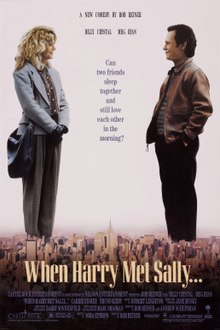| When Harry Met Sally... | |
|---|---|
 Theatrical release poster | |
| Directed by | Rob Reiner |
| Written by | Nora Ephron |
| Produced by |
|
| Starring | |
| Cinematography | Barry Sonnenfeld |
| Edited by | Robert Leighton |
| Music by | |
Production companies | |
| Distributed by | Columbia Pictures |
Release date |
|
Running time | 95 minutes |
| Country | United States |
| Language | English |
| Budget | $16 million |
| Box office | $92.8 million |
When Harry Met Sally... is a 1989 American romantic comedy film directed by Rob Reiner and written by Nora Ephron. Starring Billy Crystal, Meg Ryan, Carrie Fisher, and Bruno Kirby, it follows the title characters from the time they meet in Chicago and share a drive to New York City through twelve years of chance encounters in New York, and addresses the question "Can men and women ever just be friends?"
Ideas for the film began when Reiner and Penny Marshall divorced. An interview Ephron conducted with Reiner provided the basis for Harry. Sally was based on Ephron and some of her friends. Crystal came on board and made his own contributions to the screenplay. Ephron supplied the structure of the film with much of the dialogue based on the real-life friendship between Reiner and Crystal. The soundtrack consists of standards from Harry Connick Jr., with a big band and orchestra arranged by Marc Shaiman. For his work on the soundtrack, Connick won his first Grammy Award for Best Jazz Male Vocal Performance.
Columbia Pictures released When Harry Met Sally in selected cities, letting word of mouth generate interest, before gradually expanding distribution. The film grossed $92.8 million in North America, and was released to critical acclaim. Ephron received a British Academy Film Award, an Oscar nomination, and a Writers Guild of America Award nomination for her screenplay. The film is ranked 23rd on AFI's 100 Years... 100 Laughs list of the top comedy films in American cinema and number 60 on Bravo's "100 Funniest Movies". In early 2004, the film was adapted for the stage in a production starring Luke Perry and Alyson Hannigan. In 2022, the film was selected for preservation in the United States National Film Registry by the Library of Congress as being "culturally, historically, or aesthetically significant".[1]
Cite error: There are <ref group=lower-alpha> tags or {{efn}} templates on this page, but the references will not show without a {{reflist|group=lower-alpha}} template or {{notelist}} template (see the help page).
- ^ Ulaby, Neda (December 14, 2022). "'Iron Man,' 'Super Fly' and 'Carrie' are inducted into the National Film Registry". NPR. Retrieved December 14, 2022.